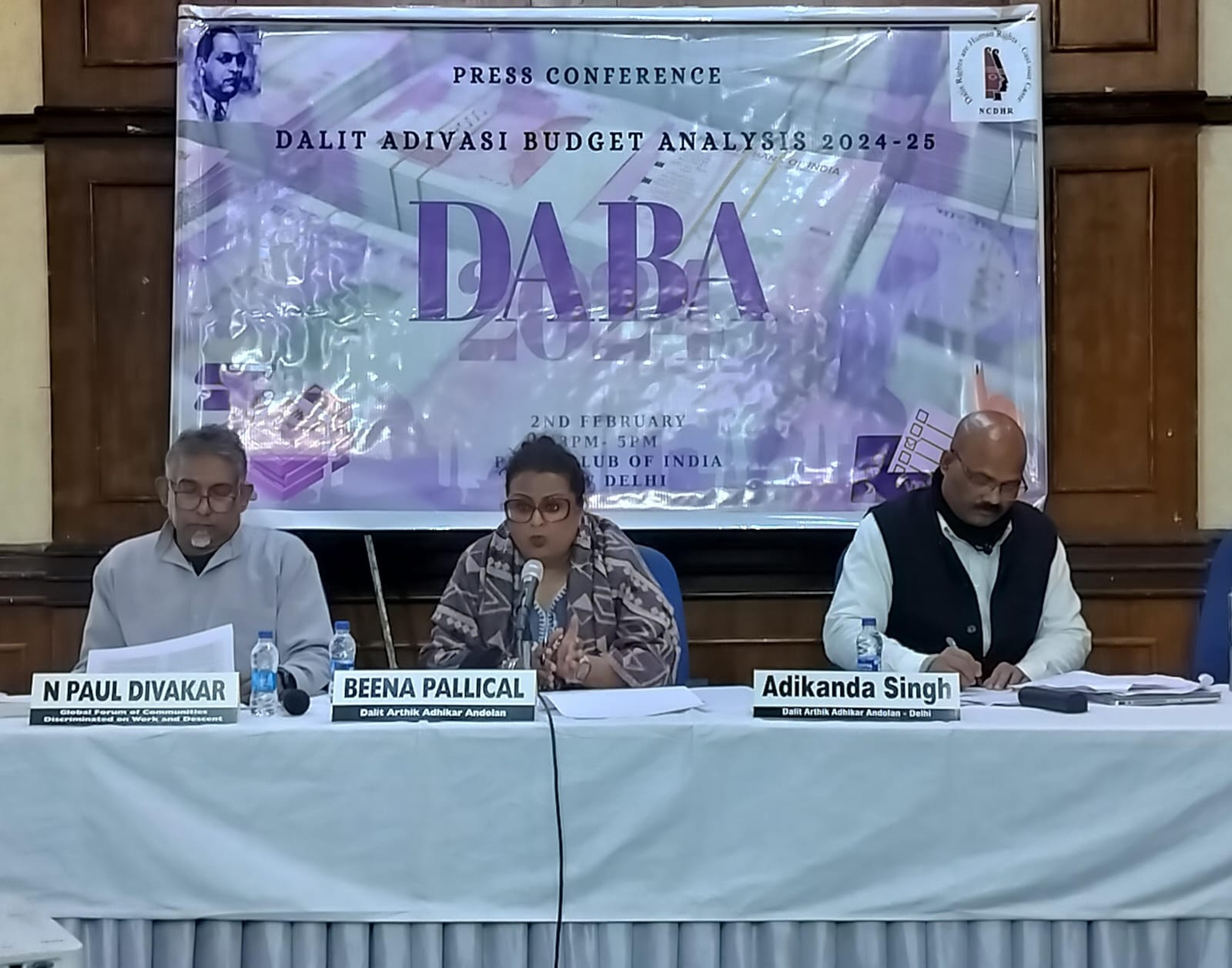Blow to social justice: India’s Union Budget 2024 leaves millions of CDWD disappointed
Even as several media publications have hailed the Interim Budget across India, there is no denying that the Interim Budget has left millions of Communities Discriminated on Work and Descent (CDWDs) disappointed. Finance Minister of India Dr Nirmala Seetharaman, stakeholders argue, belies Prime Minister Modi's clarion call of ‘Sabka Saath, Sabka Vikaas' (All together, development of and for all).
A detailed look at the budget reveals that calls for equitable and equal development that cuts across all communities remain a mere call at its best and are tantamount to chicanery at its worst.
In the last ten years, the stark truth is that the CDWDs have faced innumerable disappointment on the Budgetary front. Their accessibility to economic rights gets diluted every year and pushes them further from the path of “Vikas”(Social Development). Although there has been an increase in Budget allocation for CDWDs, it remains vastly insufficient towards ensuring Socio-Economic justice for Dalits.
“The total Union Budget 2024-25 is Rs 5,108,780 crore, whereas the total allocation for the welfare of the Scheduled Caste (CDWD) is Rs 1,65,598 crore…of this, the targeted funds that will go directly to the CDWD is Rs 44,282 crore,” the National Campaign for Dalit Human Rights pointed out in a press statement.
“The paltry allocations strengthen our belief that the budget, touted as a roadmap for economic recovery, fails to address the pressing needs and concerns of the Dalits in India, perpetuating existing disparities and hindering progress towards social justice and inclusivity,” NCDHR added.
The NCDHR also said it was ‘perturbed' by the Central Government trying to ignore the issues of Dalits by changing the whole narrative of caste.
“Despite commitments to inclusivity, the budget does not outline measures to ensure adequate representation of Dalits in decision-making bodies. This oversight denies these communities the opportunity to actively contribute to policies that affect their lives and perpetuate systemic exclusion. On the one hand, the allocation of budget towards the implementation of NREGA has increased from Rs 10500 crore to Rs 13250 crore for Dalits….on the other hand, the allocation towards Venture capital for Dalits has been drastically reduced from Rs 70 crore to Rs 10 crore,” NCDHR added.
Similarly, for National Safai Karmachari Finance and Development Corporation, there was an allocation of Rs 10 Cr, but this time there has been an allocation of only Rs. 0.01Cr, which is almost nil. On the same lines, for the National Scheduled Caste Finance and Development Corporation, last year, the allocation was Rs 15 crore, which has been reduced to just Rs 0.01 crore this year.
The Dalit community continues to face systemic challenges and discrimination, often requiring legal intervention to secure their rights and dignity. “The year 2022 has seen a strong wave of atrocities against Dalits that have come to light in various parts of the country. Compared to last year, atrocity cases against Dalits rose 13.12% to 57,582 cases compared to 2021, when the number stood at 50,900…despite these alarming numbers, the state has failed to ensure the fundamental right to access justice for Dalits as highlighted by the Interim Budget,” NCDHR added.
Worryingly, the budgetary allocations fall short of addressing the specific needs of Dalits in the justice system. The allocation towards implementation of Prevention of Atrocities,Act 1989 and Protection of Civil Rights stands at Rs 560 crore only. Cases of atrocities against Dalit women have also witnessed an increase.
“We also express deep concern over the inappropriate allocation of funds in the Gender Budget for the welfare and protection of Dalit women. The recently announced budget fails to address the specific needs and challenges faced by these communities, hindering progress towards inclusive development. The allocation of Rs. 160 crore towards the protection of Dalit women leaves the NCDHR to urge a reevaluation of the same to ensure a more equitable distribution of resources, with specific attention to the needs of Dalit women. It is imperative to recognise the intersectionality of gender, caste, and ethnicity, and allocate funds accordingly to uplift the most marginalised sections of society,” the NCDHR added.
NCDHR's recommendations include:
- There are a good number of schemes but the allocation is quite meagre and there are several irrelevant schemes with very high allocations, but unfortunately, these schemes hardly give benefit to the communities. Therefore these schemes shall be defunded.
- Allocation to direct benefit schemes like Post-Matric Scholarships, hostels, and skill development schemes should be increased and timely funds transfer should be ensured to beneficiaries at all costs. A higher allocation for the National Overseas scheme should be implemented.
- An allocation of 50% for Dalit women and a special component plan for Dalit women should be established with strong mechanisms to monitor and ensure effective implementation.
- Schemes for the rehabilitation of the women engaged in manual scavenging should be reintroduced and an adequate allocation to eliminate the practice should be in place.
- All schools and hostels must be made disabled-friendly keeping in mind the needs of people with disabilities funds should be provided to ensure this happens
- A lack of legislative framework for the implementation of SC & ST schemes has led to a lack of implementation of most schemes. There is therefore, an urgent need for the passing of the SCP/TSP legislation.
- Institute the National Climate Budget with earmarking for adaptation and mitigation by mainstreaming climate actions across the central sector and centrally sponsored programmes/schemes.
- Enhance the budget for climate actions under the AWSC and AWST proportionate to SC and ST population taking into consideration regional and socio-economic vulnerabilities and exposure to climate risks.
- Allocation for the implementation of PoA should be increased to prevent crime against Dalit women, men, children, people with disabilities and queer and trans persons. There is a need to establish clear mechanisms to provide protection and security to any victims of caste-based discrimination and violence.


